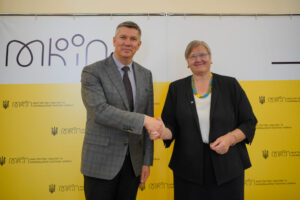
Minister for Foreign Affairs of Ukraine Andriy Sybiga met with Croatian Foreign Minister Gordan Grlic Radman in the framework of the Ukraine-South-Eastern Europe Summit, informed his Croatian counterpart about the situation on the battlefield and outlined Ukraine’s key defense needs.
“The Ukrainian Foreign Minister expressed his gratitude for the medical rehabilitation and recovery of Ukrainian defenders and their families in Croatia. This year alone, more than 800 children of Ukrainian servicemen have already been rehabilitated in Croatia. The ministers discussed the continuation and expansion of these programs,” the statement reads.
Sibiga also praised the solidarity of the Croatian side, in particular the leadership in assisting in the humanitarian demining of the territories liberated from occupation and the restoration of damaged energy infrastructure.
The Foreign Minister emphasized that Ukraine appreciates Croatia’s support for efforts to prevent the election of Russian representatives to the governing bodies of international organizations, including the Executive Council of the Organization for the Prohibition of Chemical Weapons. Sibiga also emphasized the importance of Croatia’s participation in the Ministerial Conference on the Human Dimension under the fourth point of Ukraine’s Peace Formula, “Release of all prisoners and deportees,” which is scheduled to take place in Canada in the near future.
In his turn, Grlić Radman emphasized Croatia’s readiness to continue to consistently support Ukraine in defending its sovereignty and territorial integrity.
The Croatian minister assured of the readiness of Zagreb to further assist Ukraine on its path to joining the EU and NATO.
The parties agreed that Croatia’s experience of joining the EU is important for Ukraine and discussed the provision of relevant expert support.

The death toll from the devastating floods in Bosnia and Herzegovina, which are being called the worst in decades, has already reached 19. On the morning of October 4, it was reported that heavy rains in Bosnia on Friday night had flooded several cities in the central and southern parts of the country.
After 16 people died in the municipality of Jablunice, rescuers also found the bodies of three people in the city of Fojnice, where the bad weather destroyed many houses and outbuildings.
Against this backdrop, Serbian President Aleksandar Vucic and Croatian Prime Minister Andrej Plenkovic agreed to provide all necessary assistance to Bosnia and Herzegovina.
Vucic previously noted that Serbia could send rescue helicopters and boats, as well as provide financial assistance.
And the Croatian prime minister said that his government is in constant contact with the head of the Council of Ministers of Bosnia and Herzegovina, Borjana Krishto, and is ready to provide “all the necessary assistance in eliminating the consequences of the flood.”
The EU High Representative for Foreign Affairs and Security Policy, Josep Borrell, also confirmed the readiness to help. He noted that Bosnia could benefit from the EU’s Civil Protection Mechanism, which it joined in 2022.

87 children from the families of Ukrainian defenders went on a tourist trip to Split, Republic of Croatia.
The trip was organized at the invitation of the Embassy of Ukraine in the Republic of Croatia, namely Ambassador Extraordinary and Plenipotentiary of Ukraine to the Republic of Croatia Vasyl Kyrylych, with the assistance of the Honorary Consul of Ukraine in Croatia Ivica Piric and the Government of the Republic of Croatia.
In gratitude for the trip, the children of Kyiv region presented Ivica Piric with a traditional Ukrainian motanka doll, which symbolizes prosperity and will become a talisman for his family.
“Since 2015, more than 3,500 children whose parents are defending Ukraine at the front have had a vacation in Croatia. The project has been funded by Croatia since its inception and has the support of the Ukrainian Embassy and Croatian Prime Minister Andrej Plenković. I, like many people in the Croatian government, am a child of war. We understand how important it is for children to undergo rehabilitation,” said Ivica Pirić, Honorary Consul of Ukraine in Croatia.
For 10 days, the children will have the opportunity to enjoy active recreation in the seaside city of Split, excursions, and communication with their Croatian peers. Five meals a day will be organized for the participants of the trip.
“Our defenders are defending us at the frontline, and we strive to create favorable conditions and give more positive moments for their families. When Mr. Ambassador of Ukraine to Croatia Vasyl Kyrylych offered to send the children of our military personnel on a tourist trip, we gladly accepted. The Honorary Consul of Ukraine in Croatia Ivica Piric has been organizing vacations for kids for several years now, and I am sure that the program will be extremely rich and interesting. We sincerely appreciate the support of our Croatian friends, which is so important to us,” emphasized Lesia Karnaukh, Deputy Head of the Kyiv Regional State Administration.

Croatia will provide another EUR 5 million for the Ukrainian energy sector, Prime Minister Denys Shmyhal said following a meeting with Croatian Prime Minister Andrej Plenkovic.
“Mr. Plenkovic announced a new package of military assistance and another EUR 5 million for the Ukrainian energy sector. Ukraine highly appreciates all the assistance provided by Croatia. Thank you for supporting our country in all spheres,” Shmyhal wrote on his Telegram channel.
In addition, he said that the countries had signed two documents in the field of education and justice, which will contribute to Ukraine’s further European integration.
Among other things, the prime minister said that on Wednesday, the Croatian demining company DOK-ING opened its representative office in Ukraine.

Croatia will host 100 children of wounded and killed Ukrainian soldiers for rehabilitation in the fall.
According to the Honorary Consul of Ukraine in Split (Croatia) Ivica Pirić, Croatia has been organizing recreation for Ukrainian children by the sea since 2015 with the organizational support of the Embassy of Ukraine in Croatia and the Prime Minister of Croatia. Over the 9 years of the program, which is funded by the Ivica Pirić Foundation, 3.5 thousand Ukrainian children and 400 combatants have visited the seaside city of Split in Croatia.
“In 1991-1995, Croatia went through a war in which more than 20 thousand people died and thousands of soldiers became disabled. Much of Croatia’s territory was mined, and cities and towns were heavily damaged. Many IDPs had to go through a difficult period of reintegration. Croatia has extensive experience in treating and rehabilitating military personnel and treating post-traumatic stress disorders in children. The current generation of Croats, including government officials, are children of war, and they are very close to the problems that Ukraine is facing today, so we want to help. The least we can do is to give a holiday by the sea to the children of Ukrainian heroes who are defending Ukraine’s independence,” Pirić said.
In October 2023, Ukraine and Croatia signed an agreement on cooperation in the field of demining, which provides for training of specialists, surveying of territories, their demining and clearing, and exchange of experience in the production of demining equipment. According to the Ministry of Economy of Ukraine, Croatian demining machines are operating in Ukraine, and in mid-2023, Ukrainian and Croatian manufacturers agreed to localize the production of such machines in Ukraine.
Pirić is a Croatian footballer who has been working as a FIFA agent since his retirement. Since 2016, he has been the Honorary Consul of Ukraine in Croatia. Pirić helps wounded Ukrainian soldiers and children affected by military operations.

Acting Minister of Culture and Information Policy (MCIP) Rostislav Karandeyev discussed with the Ambassador of the Republic of Croatia to Ukraine Anica Dzhamic the preservation of cultural heritage amid ongoing Russian aggression, the press service of the Ministry of Culture and Information Policy reported.
“The discussion focused on the needs of Ukraine in the field of preservation of cultural heritage suffering from Russian aggression, return of cultural values, protection of intangible cultural heritage. It was also about cooperation within the framework of UNESCO activities,” the report said.
Karandeev spoke about the challenges facing Ukraine. Among them, in particular, the preservation of cultural heritage and people of the cultural sphere. He thanked the Croatian government for financial and material assistance to Ukrainian citizens who will continue to need it because of Russia’s aggression.
“We would like our citizens to keep in touch with their country and not lose their Ukrainian identity. It is important to create favorable conditions for this,” said Karandeev.
Also, the head of the Ministry of Culture emphasized the need for Ukraine to create a depository for the preservation of evacuated museum values and emphasized the value of Croatian experience in this matter. He also proposed to intensify cultural cooperation: the organization of Ukrainian exhibitions, tours, film screenings in Croatia, as well as the creation of conditions for learning the Ukrainian language and support for book publishing, translations of Ukrainian authors into Croatian.
In addition, the parties discussed the problems of preservation of intangible cultural heritage, in particular, the Greeks of the Azov region.
In turn, the Croatian Ambassador offered to hold an online meeting with the responsible persons in the Ministry of Culture and Media of the Republic of Croatia on the preservation of cultural heritage, and reiterated support for Ukraine.
“Croatia has been with Ukraine since the first days of the war, primarily because of its own experience of the war it lived through. Our experience helps Ukraine to more quickly master the processes that await it, as well as to avoid mistakes that the country may make out of inexperience,” said the Ambassador.